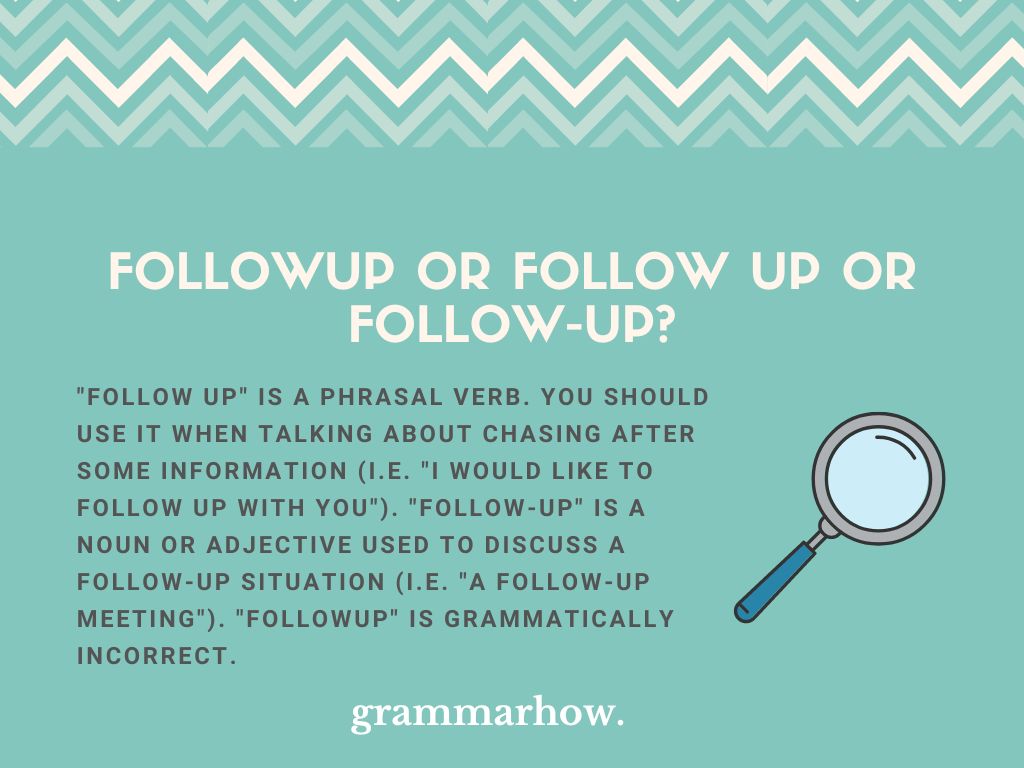“Follow up” can be used in a few different ways. It is either a noun, an adjective, or a verb. Each way has something different you need to pay attention to. This article will look into whether “follow up” is correct as one or two words or in the hyphenated form.
Followup or Follow Up or Follow-up?
“Follow up” is a phrasal verb. You should use it when talking about chasing after some information (i.e. “I would like to follow up with you”). “Follow-up” is a noun or adjective used to discuss a follow-up situation (i.e. “a follow-up meeting”). “Followup” is grammatically incorrect.

KEY TAKEAWAYS
- “Follow up” is a phrasal verb that shows the action of providing more information.
- “Follow-up” is a compound noun or adjective used to refer to a follow-up situation.
- “Followup” is never correct.
You should ensure you know the key differences between the three forms that “follow up” uses:
- Verb: I need to follow up with him. I should learn more about the situation.
Here, “follow up” is an action. It refers to something someone is doing by “following up” with someone.
- Adjective: I need the follow-up questions from the meeting. Do you have them?
Here, “follow-up” is modifying the noun “questions.” This is a compound adjective where the hyphen groups “follow-up” to show the modification.
- Noun: I would like a follow-up about this. Do you have the time?
The compound noun is similar to the compound adjective but doesn’t come with another noun after it. It should still be hyphenated to show that “follow-up” is the thing being spoken about.
Is “Follow-up” Hyphenated?
“Follow-up” is hyphenated in two situations. You should hyphenate it when it comes directly before a noun in your writing.
- I’m going to need to send a follow-up email about this. I’m not sure what to include in it, though.
- I want to be there for a follow-up interview. Do you think you have any good questions?
“Follow-up” can modify a noun as long as it comes directly after the adjective form.
AP Style rules teach us that multiple words can be hyphenated when they modify a common noun. Since “follow” and “up” both modify a noun in the same way, you should hyphenate them to show the common link.
You might also find “follow-up” hyphenated as a compound noun. It’s similar to the adjective form but refers to a follow-up situation without needing a noun directly after it.
- I would like to ask you for a follow-up. Do you have any more information that will help me?
- They needed a follow-up with him, but he didn’t seem to be around to talk to them.
“Follow-up” as a compound noun modifies itself to show that you are looking for more information. You do not need any other nouns after it. If you place another one, it returns to the compound adjective form.
Is “Followup” One Word?
“Followup” is officially incorrect. You should avoid writing it in every formal case, though it’s slowly becoming more popular as English evolves.
You won’t often find the one-word variation because the hyphen is required when using the adjective or noun forms. Official dictionaries do not recognize “followup” as one word, meaning it is not formal or appropriate in most cases.
Nevertheless, it’s becoming vastly more popular as English evolves. When languages evolve, they try to simplify things to keep it easy for everyone. That’s why hyphens are often dropped in favour of one-word variations.
“Followup” can never be used as a phrasal verb. It does not replace the “follow up” variation as two words. It can only be used informally to replace the hyphenated variations (the compound adjective and noun).
- I’m going to need a followup meeting with him. Can you arrange that?
- We need a followup with her. I’m not going to wait around forever.
It’s best to avoid this form until English dictionaries officially recognize it. Most formal writers would tell you it is incorrect.
Is “Follow up” Two Words?
“Follow up” is very common as two words. It’s grammatically correct to use it this way as a phrasal verb only.
You can write “follow up” when referring to someone taking a “follow up” action by finding out more from someone. It’s only correct as a verb form.
- I need to follow up with them to find out whether they have the money. I can’t wait around forever.
- You should follow up to learn more about this. I’m excited to hear what they have to say.
“Follow up” should not be used as a compound adjective or noun as two words. The hyphen is required in these forms to show that modification is taking place:
- Correct: The follow-up questions have been revised. Try asking him some of these now.
- Incorrect: I will not give him the follow up meeting he’s looking for.
Always hyphenate “follow up” if it is a noun or comes directly before one.
Is “Follow Up” Capitalized in a Title?
“Follow Up” should be capitalized in every title you include it in. Most title styles require verbs, nouns, and adjectives to be capitalized to keep them in line with the rest of the title.
“Follow-up” comes with a slightly different rule in titles.
“Follow-up” only capitalizes “follow” when used in most common title formats. You do not need to capitalize “up” when it is part of the hyphen form as the hyphen treats it as one word and “follow” already has a capital letter.

Martin holds a Master’s degree in Finance and International Business. He has six years of experience in professional communication with clients, executives, and colleagues. Furthermore, he has teaching experience from Aarhus University. Martin has been featured as an expert in communication and teaching on Forbes and Shopify. Read more about Martin here.
